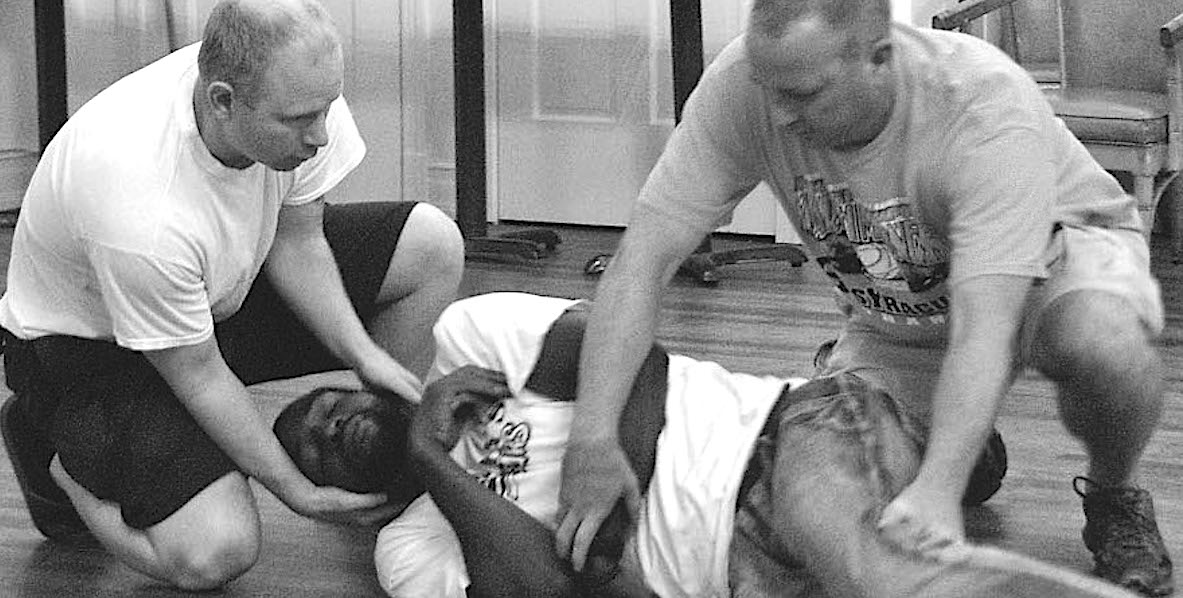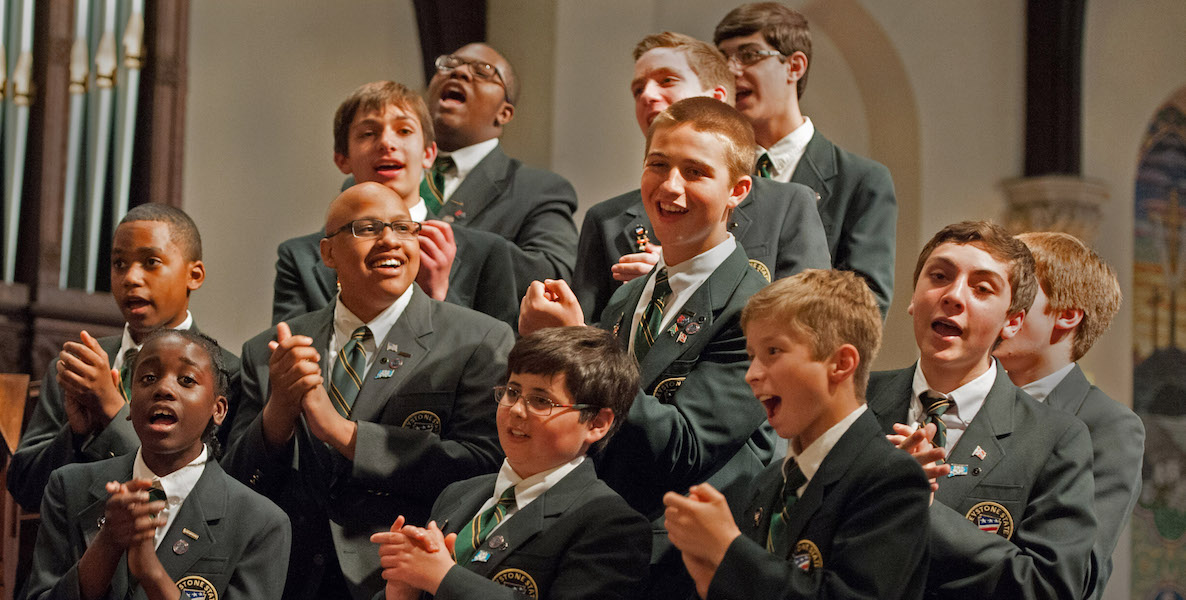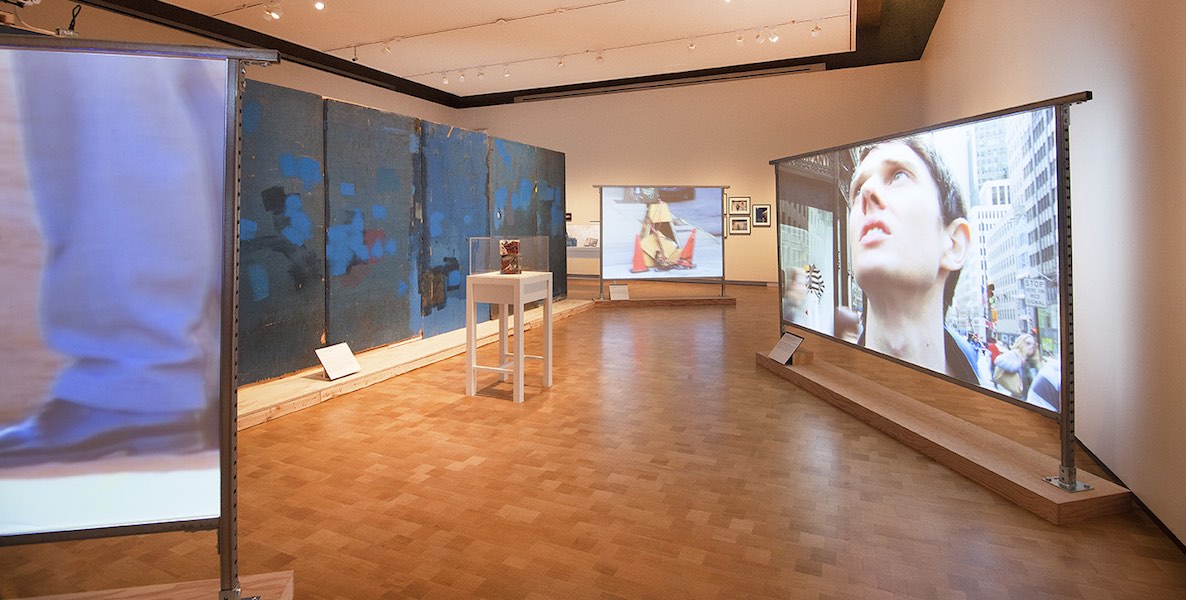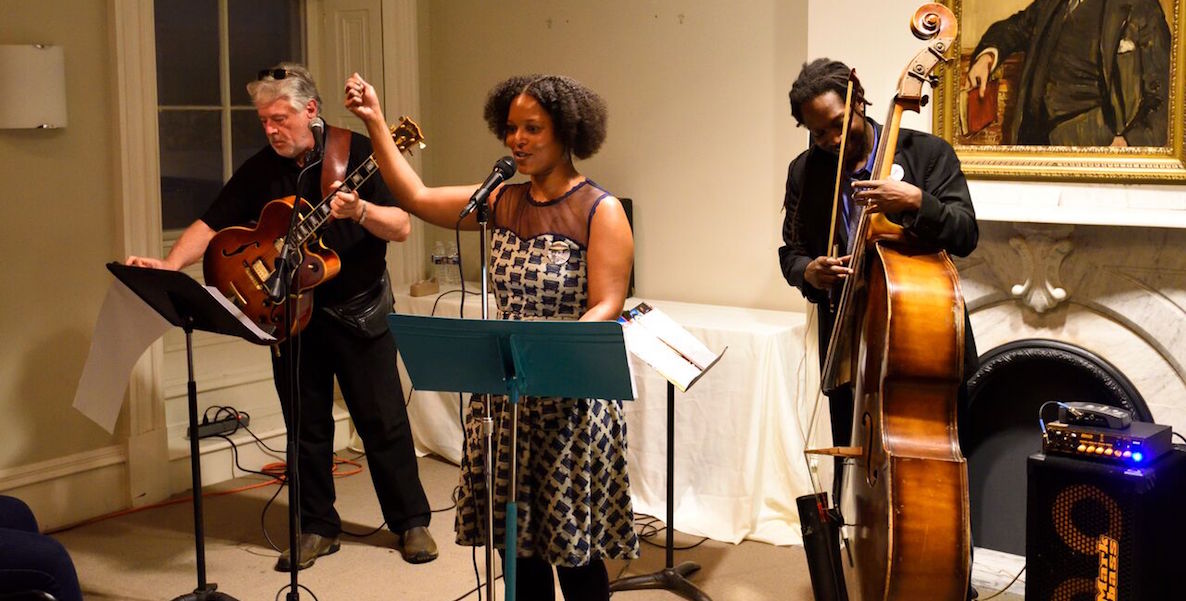Who would you rather have as a best friend: Jane Eyre or Elizabeth Bennet?
“Oh, that’s so obvious,” scoffs Ed Pettit, The Rosenbach’s manager of public programs. We’re at the midway point at this month’s Bibliococktail party, themed “Austen versus Bronte,” and Pettit is reading from the list of ice-breaker questions handed out to this evening’s attendees. He swirls his plastic cup filled with the bracing whiskey-based “Thornfield” drink (named after Mr. Rochester’s estate in Jane Eyre, of course).
Be Part of the Solution
Become a Citizen member.Most of this crowd—bookish hipsters, random party people, and graying bookworms—is already at least two stiff cocktails in at this point. Guests have been tasked with sampling the themed drinks and then voting for a winner. (My vote goes to the vodka-based Pemberley, named for Mr. Darcy’s estate in Pride and Prejudice). Some guests are still at the temporary tattoo table, applying Austen and Bronte themed “ink,” as Pettit waits for a response.
A woman sitting by the windows calls out, “Jane Eyre.”
Pettit dramatically steps back in surprise, very much the jovial ringmaster in his corduroy blazer, glasses, long white beard, and temporary Jane Austen-tattooed forearm. (He proudly displays that to the guests later in the evening.)
“I guess it’s not so obvious!” he concedes. After running through the rest of the questions, he reminds folks of other upcoming events—including next month’s cocktail party featuring Shakespeare’s sonnets. Like this one, that party will also be sponsored by Philly-based Quaker City Mercantile—creator of Art in the Age liquors—and will, if all goes as planned, draw an increasingly diverse crowd of new members to the Rosenbach.
“We celebrate our intimacy,” says Dreher. “But exclusive is not a good thing to be.”
Since his arrival last year, Pettit has brought the number of functions up to around 60 a year from around 12 the year before. It’s all part of an effort on the part of the small Rittenhouse Square museum to make itself relevant to today’s Philadelphia, after a kind of “come-to-Jesus” realization that times were changing, and the Rosenbach must as well.
The people who work at the Rosenbach museum and library hate to hear it described as a “hidden gem.” Tell them it’s “Philadelphia’s best kept secret” and you’re likely to get a wince in response. But, you know what? Those labels still kinda fit—at least for now. Ask the average Philadelphian if they know of the Rosenbach, much less where it is, and you’re likely to get a very blank look.
But those who do know the Rosenbach are enthusiastic about its charms. (And if you don’t know, it’s located in two elegant 19th-century town houses at 2008-2010 Delancey Street, one of the swankiest blocks in the Rittenhouse Square neighborhood.)
The Rosenbach Museum, founded in 1954, used to have a reputation for being exclusive and even wary of the public. Board chair Arthur Spector remembers what it was like in the 1960s when he lived on the same block and would go in to peruse the collection: “It was very much a private club. There was no open door. I used to walk around and I swear I never met anybody in there.
Derek Dreher, the museum’s director, describes a more recent era: “When I arrived here to work in the late 90s, it wasn’t known for anything. The front door of the museum was kept locked even when it was open for business. If you came to visit, you had to ring the bell and wait. Then someone would open the door a crack and they’d decide if you were a risk to be admitted. It was astonishing how elite the place was.”
Word is spreading about the quirky, cool new programming going on inside the museum. The demographics still skew older and whiter, but the numbers of younger, more diverse patrons is growing steadily.
But, if you could bear the scrutinizing looks and closed-door policy, what you found inside was thrilling. The breadth of the collection of books, manuscripts and objects would make any literature groupie giddy. It’s surprisingly intimate to read a literary lion’s private letters or scribbles of notes on the side of a manuscript. Bibliophiles have made pilgrimages from around the world to visit cherished hand-written manuscripts and famous first-edition books. A museum docent reports: “We’ve had people from as far as Japan, Norway, and Brazil who’ve come and said it was a religious experience for them.”
The crown jewel of the collection, which includes 30,000 rare books, 300,000 manuscripts, and 20,000 works of art on paper, is arguably the 800-page original handwritten manuscript of James Joyce’s Ulysses. It certainly cuts the highest profile, serving as the centerpiece of the Rosenbach’s annual June 16 Bloomsday reading on the front steps of the building. But the collection has so many superstar items it’s hard to limit the shout-outs. Here are a few: works by Joseph Conrad, Herman Melville, William Shakespeare, Charles Dickens, Jane Austen, Phillis Wheatley, Emily Dickinson, plus letters by George Washington and Oscar Wilde, and even Thomas Jefferson’s handwritten recipe for cheese.
This is the legacy of the two Rosenbach brothers, Abraham and Philip, born around the time of the Civil War into a large, Jewish family. These bachelors opened a shop in 1903 on Walnut Street where they sold fine art, books, and manuscripts. They were the book dealers to the bluest of the blue-bloods. Clients included J. Pierpont Morgan, Henry Huntington, and Henry Folger whose collections became the Morgan Library, The Huntington Library, and the Folger Shakespeare Library. Friendships with people like Shane Leslie, the first cousin of Winston Churchill, and the Wideners (whose son Harry died aboard the Titanic) helped doors fly open into the most rarefied circles. The Rosenbachs were instrumental in the creation of the Widener Library that ended up at Harvard University. But the brothers steadily amassed their own private collection along the way, which they wanted to share with the public after their deaths. They died nine months apart in 1952 and 1953.
But the museum arrived at an organizational crossroads about seven years ago. A profound course-correction of its mission was required to keep the museum alive and relevant to a wider, more diverse audience. There’s nothing like a looming financial disaster to motivate change. Cue the financial crisis of 2008, which made all investments, donations and grants contract.
![]() “We came through some challenging years,” says Dreher. “When you run a really small non-profit [with a staff of 12 full-time employees], it is buffeted by the recession more than a large organization that can weather storms more easily. We had downsized staff and programming in the wake of the recession. We weren’t spreading our wings and giving people a reason to get involved.”
“We came through some challenging years,” says Dreher. “When you run a really small non-profit [with a staff of 12 full-time employees], it is buffeted by the recession more than a large organization that can weather storms more easily. We had downsized staff and programming in the wake of the recession. We weren’t spreading our wings and giving people a reason to get involved.”
Endowment investments were sagging, donors were reducing gift sizes, reliable benefactors died in that period and grants the museum counted on weren’t coming through. “When a few things happen at the same time, you reach an inflection point,” Dreher explains. “We needed to change something.”
It began with new board leadership. Arthur Spector, who’d joined the board in 2009, was appointed chairman in 2011. From that point on, the pace of change quickened rapidly. (The board of directors has since turned over about half of its 23 members.)
“Arthur arriving as the chairman triggered the Rosenbach’s change,” Dreher says. “We had been saying ’It’s been really tough, but we will try harder,’ and Arthur said ‘What makes you think trying harder, which hasn’t worked for 10 years, will work in the 11th year?’ Arthur felt we needed a different paradigm.”
He got it.
Spector, founding partner of the Safeguard International Fund, wanted to chart a new path forward for the museum and knew it would need to find a strategic partner to make it possible. The Boston-based consulting company that the museum hired, TDC, urges its non-profit clients to think of new avenues. “We were told that foundations were not going to pick up the slack after the recession,” recalls Dreher. “There was no more sympathy funding.”
So Spector took that different avenue. He sought out a formal affiliation with the Free Library of Philadelphia Foundation, where his wife, Miriam, is second vice chair of the board. Over the years, Spector says, he learned from Miriam about the ways in which the Library turned itself into a social service and community hub—something that got people excited, beyond just books. The two organizations officially announced their partnership in 2013.
The collection includes 30,000 rare books, 300,000 manuscripts, and 20,000 works of art on paper, including the 800-page original handwritten manuscript of James Joyce’s Ulysses and works by Joseph Conrad, Herman Melville, William Shakespeare, Charles Dickens, Jane Austen, Phillis Wheatley, Emily Dickinson, and even Thomas Jefferson’s handwritten recipe for cheese.
“I approached Siobhan Reardon, the director of the Library and made a pitch to her,” remembers Spector. “The two institutions have incredibly similar missions. Both of them want to engage the public intellectually. She and I spent a lot of time talking how these two institutions could be combined. It wasn’t an easy sell.”
The Free Library wasn’t ready to affiliate until it was confident the Rosenbach had the resources in place to be able to make the necessary changes. “We were breaking even, but not doing much in the way of programming,” says Spector. “So the Library had an imaginative solution. It asked us how long it would take to increase our development effort, break even, and excite the community. The answer was five years. They said if you and the board can raise $3 million dollars that will fund you through that five-year period, then we’ll do the deal. I must say, that’s not a happy assignment, but we raised the money in three months.”
So how good is the programming? Last year the museum hired Pettit to be manager of public programs. He and Andrew Nurkin, the recently hired head of the Library’s Center for Public Life, have been teaming up to produce a roster of courses, lectures, panels, parties and readings that speak to the Rosenbach’s commitment to emerge as a brighter star on the Philadelphia cultural stage. Word is spreading about the quirky, cool new programming going on inside the museum. The demographics still skew older and whiter, but the numbers of younger, more diverse patrons is growing steadily.
![]() This January, the museum hosted a night at Macy’s and screened the silent film classic Nosferatu, with Fred Haas live on the department store’s pipe organ. Four hundred people attended, many of whom found the event through social media. A third of that audience was new to the Rosenbach.
This January, the museum hosted a night at Macy’s and screened the silent film classic Nosferatu, with Fred Haas live on the department store’s pipe organ. Four hundred people attended, many of whom found the event through social media. A third of that audience was new to the Rosenbach.
Poet Yolanda Wisher’s Rent Parties held at the museum are also pulling in a new crowd. A nod to Harlem Renaissance parties thrown to raise rent money, the Rosenbach’s version fuses poetry, jazz by Wisher’s house band, The Afroeaters, and cocktails. Last week ended the sold-out three-part lecture series on the Federalist Papers. On Tuesday, The New York Times Magazine writer Emily Bazelon spoke for an hour on the impact that plea-bargaining is having on our justice system.
There is, clearly, still work to do: The crowd for the Bazelon event did not exactly scream youthful diversity. But there’s lots to choose from for lots of different bookish audiences: literary courses, dramatic works, and, fingers crossed, a tentative marathon reading of Melville’s Moby Dick to celebrate the author’s centenary.
“We feel like we’ve managed to find the formula that is making us compelling to people and our audience is growing,” Dreher says. “We never said we wanted to be big. The intimacy of our programs is the thing that separated us from other places. We celebrate our intimacy. But exclusive is not a good thing to be.”
Correction: An earlier version of this story indicated that Ed Pettit’s Austen tattoo is permanent. It was temporary.
Photo via the Rosenbach during Yolanda Wisher's Rent Party in September 2017.






